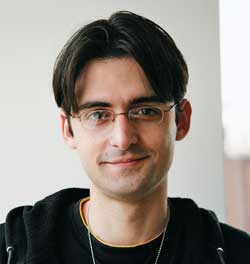George Paul Meiu on subjectivity
Started doing ethnographic research while still in high school in Romania

George Paul Meiu has contributed to his department while studying here.
Photo by marion elissalde
Not many 23-year-olds can discuss how they plan to write their second book. George Paul Meiu (Honours Anthropology) does so thoughtfully.
Meiu arrived here from Romania with his family in 2003. He had already spent several high school years working for the Museum of the Romanian Peasant. While working for this cultural institution he studied a ritual, popular in rural Trans-ylvania, which involved young men in masks travelling from house to house, singing carols at Christmastime. The practice was intended to purify the homes visited.
Communist authorities en-couraged young men to perform these songs on stage at summer festivals, stripping the activity of its original meaning and transforming it into a nationalist display.

Meiu wrote a book in Romanian about this ritual’s transformation over the last 100 years. Meiu himself was from a village 20 kilometres away from the one he was studying, where he continued to participate in the same ritual. He spent time in both communities during summers and holidays.
“I was travelling back and forth, trying to have distance and also being in the midst of things.” That balance between privileged access and academic objectivity was omitted from his book. “My next book will be more subjective.”
Meiu transferred his interests to a totally different region of the world. With the help of professors Christine Jourdan and Anthony Synnott, he got funding to go to Kenya, intending to study a dance ritual that had emerged in the 80s as a tourist attraction. Instead, he became interested in European women tourists who developed relationships with Masai warriors.
The topic of women’s sex tourism has gained attention with films like The White Masai. “Most of the literature used these situations to say ‘See, women do it too,’” Meiu said. “Instead, I wanted to look at more complex questions about sexuality across culture and gender.”
His research has sent him to several conferences here and in London, England. His presentation also earned him first prize at this year’s inaugural Undergraduate Research Day. At graduation he will receive the Everett C. Hughes Medal.
Meiu will be heading to the U.S. this summer to begin a PhD with a fellowship offered to him by the University of Chicago.